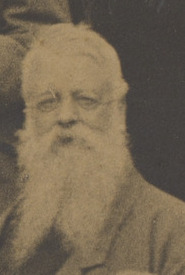James Francis Tennant facts for kids

James Francis Tennant (born January 10, 1829 – died March 6, 1915) was a very important soldier and astronomer. He was known for his work with the army in India and for studying the stars and planets.
Contents
Early Life and Education
James Francis Tennant was born in Calcutta, India. His parents were from Scotland. His father, Sir James Tennant, was also a high-ranking army officer.
Young James went to a special school for soldiers. It was called the Military Seminary at Addiscombe. He studied there from 1845 to 1847. After finishing school, he started his army career in 1847. He joined a special army unit called the Bengal Engineers in Calcutta.
Mapping India and Discovering Astronomy
James Tennant was very good at math. Because of his skills, he joined the Great Trigonometric Survey. This was a huge project to measure and map all of India. He helped measure distances and map the land until 1857.
In 1857, he had to stop his mapping work. He was called to do army duties during a time of unrest in India, known as the Indian Mutiny. After this, in 1859, he went back to the survey. He was then put in charge of the Madras Observatory. This is where he first became very interested in astronomy, the study of space.
Observing the Skies
James Tennant became famous for his astronomy work. He was an observer for the Royal Astronomical Society. He helped study two important events in the sky:
- A solar eclipse on August 17, 1868, which could be seen across India.
- Another solar eclipse on December 11, 1871, seen in southern India.
He also observed the transit of Venus in 1874. A transit of Venus is when the planet Venus passes directly in front of the Sun.
Photography in Astronomy
During these observations, James Tennant used cameras a lot. This was one of the first times photography was used so much in astronomy. Tennant was very skilled at taking pictures. His photography helped scientists study the eclipses, especially the Sun's outer atmosphere, called the solar corona.
Later Life and Retirement
In 1876, James Tennant was given a new job. He became the Master of the Calcutta Mint. This was a place where money was made. He held this important job until 1882.
After that, he retired and moved back to England. Even in retirement, he stayed involved in astronomy. In 1885, he was elected to the council of the Royal Astronomical Society. He even served as its president from 1890 to 1891. During this time, he was very interested in comets. He helped calculate their paths as they moved through space.
 | Selma Burke |
 | Pauline Powell Burns |
 | Frederick J. Brown |
 | Robert Blackburn |

